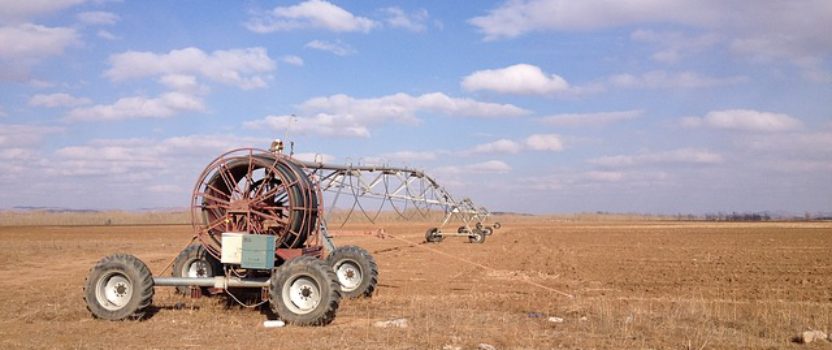Post 4|2016
Three months ago an historic agreement between nations was signed in a town just out of Paris. Last week Fiji was the first country to ratify the agreement, as it was battered by a hurricane with winds of over 300 kilometres per hour. The agreement is to limit global warming to less than 2 degrees and, hopefully, only 1.5 degrees. Is the ferocity of the wind confronting Fiji the just the expected adverse weather, that is part of the South Pacific in summer, or is it a result of climate change? One way or another, climate change clearly matters to the people of Fiji.
How should I think about the weather that we have experienced this summer and how should I think about the where to next question on climate change? We had extreme heat early in the summer and now it looks like we are having an early autumn, but we are short of water; it just hasn’t rained much in our area. The climate is noticeably different than I remember it to be and yet a really old farmer, who we met while walking the dogs the other day, says he has seen it all before and it will rain soon. In the way, I suspect, of many Fijians I wonder what these observed changes in weather really mean. Is this climate change or just seasonal variation? Does it matter? I know the answer lies in looking at changes in long term patterns, but I don’t know, off the top of my head, what the long term pattern looks like so, right now, I feel considerable uncertainty which is disproportionate but never-the-less real. Climate change is happening and I don’t need to see it in our community to know this, but I think I keep watching for the start of the challenges that I am sure will come and water will be one of them.
Last week I heard the first rumblings of tension between local farmers, who use bore water to irrigate their potato crops. Those whose bores are more shallow than their neighbours, have restricted flow on some days as, presumably, the aquifers are depleted faster than they are replenished. Restricted flow means that the highly specific water requirements for potato crops, given to farmers by the multi-national food processor that the buys their potatoes, may not be met and so the crop may not be worth as much or, in the worse case unsaleable.
Tension between neighbours and families is a concerning possibility, let alone tension between communities and nations; if we are to deal with the manifestations of climate change, then we will have to cooperate. The possibility that we might have to deal with social breakdown as well as massive change, all of which is variously foreshadowed by those who have spent a lot of time thinking about these matters and modelling possible scenarios, is both frightening and exhausting. When are we going to see national initiatives to mitigate the effects of climate change?
As I try to live my low carbon life, these are the matters that I have been reflecting on over the last fortnight and for those who read Post 3, I said I would look up the R value of our ceiling/roof insulation. It is R6.0 so no retrofitting is required if I use the standards recommended by Beyond Zero Emissions!
Interesting Reading
Helping me to understand what a Low Carbon Life might be ….
Over the last fortnight, I have been mainly reading for pleasure so nothing about climate change or a low carbon life! I did, however, come across a US site where someone has recorded in a book, with a few details on a website, what it is like to live a life where your emissions are less than 1.0 tonne of CO2 equivalent per year. I intend to have a close look at both the site and the book, because here is someone whose interests are similar to mine, but he has established what is ‘good enough’ in terms of effort. He may well have my question about measurement answered.
Projects
New initiatives leading towards a Low Carbon Life ….
Once again, this fortnight I didn’t do any work on any projects! Shame on me again but there will be news in the next fortnight’s post.
Incidents
Domestic maintenance leading towards a Low Carbon Life ….
This fortnight I did more work on:
- The Faulty Inverter Incident. Resolution of this incident will be the resumption of solar electricity being available to us in the prime generating time of summer. So far I have learnt to be really, really patient and control my frustration! It now looks like our fifth inverter will be a success! Read more ….
- The Range-hood Incident. So far I have learnt that when buying appliances, trying to work out how long they will last might be as important as understanding how much energy they need to operate. Read more ….
Really ….
Jeremy Leggett reporting for the Huffington Post tells us that over the last fortnight, a retired Shell employee wants the Shell employees’ pension fund to no longer invest in fossil fuels because the fund is likely to lose money and hence effect his pension. How can someone who spends his entire working life employed by a company that makes its money from fossil fuels, that still maintains fossil fuels are not causing climate change, that believed (at least until recently) that they will last for ever and not become a ‘stranded asset’ then retire, take a company pension and immediately demand that the pension fund no longer invest in fossil fuels to make sure the value of his pension is maintained? Take note if you still believe that oil, gas and coal companies have a bright and positive future.
Until next time, Jane

